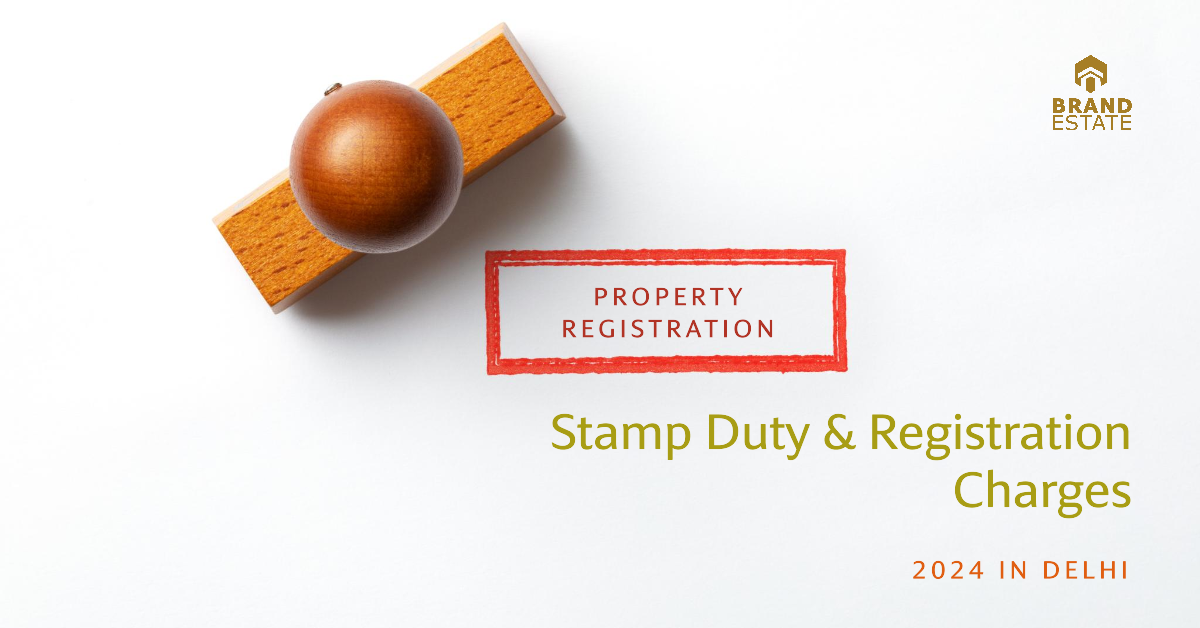This comprehensive guide delves into the intricacies of Delhi stamp duty and registration charges in 2024, providing you with clear and up-to-date information. By the end of this blog, you’ll be equipped to accurately calculate these costs and make informed decisions regarding your Delhi property purchase.
Understanding Stamp Duty
What is Stamp Duty?
Stamp duty is a tax levied by the government on the transfer of immovable property. It’s essentially a legal document validation fee, signifying the government’s approval of the property sale. In Delhi, the stamp duty is a significant expense, so understanding its calculation is crucial.
Calculating Stamp Duty in Delhi
The stamp duty in Delhi is calculated based on a percentage of the property’s value. However, there’s a twist – the government considers two values:
- Registered Price: This is the price agreed upon between the buyer and seller, as reflected in the sale deed.
- Circle Rate: This is a government-determined minimum value assigned to each locality in Delhi. It acts as a benchmark to prevent undervaluation of property and ensure fair taxation.
The higher of these two values is used to calculate the stamp duty. This ensures the government receives its due tax revenue, regardless of any potential underpricing agreements.
Standard Stamp Duty Rates:
The stamp duty rate in Delhi varies depending on the gender of the primary owner and the type of ownership:
- Male: 6%* of the property value
- Female: 4%* of the property value
- Joint Ownership (Male & Female): 5%* of the property value
Example:
Let’s consider a property with a registered price of Rs. 1 crore and a circle rate of Rs. 1.2 crore. Since the circle rate is higher, it will be used for stamp duty calculation.
For a male buyer, the stamp duty would be:
Stamp Duty = 6% * Rs. 1.2 crore = Rs. 7,20,000
Delhi Cantonment Board Area:
Properties located within the Delhi Cantonment Board area have a different stamp duty rate. Here, a flat rate of 3%* applies irrespective of the owner’s gender.
How to Pay Stamp Duty Online in Delhi (2024)
Thankfully, the process of paying stamp duty in Delhi has been simplified with the introduction of e-stamping. This eliminates the need for physical cash transactions and offers a convenient online payment method. Here’s a breakdown of the steps involved:
1. Choose Your Platform:
There are two primary ways to pay stamp duty online in Delhi:
- Stock Holding Corporation of India Limited (SHCIL) website: This is the central government agency authorized to handle e-stamping across India. You can access their portal at shcilestamp.com.
- Delhi Revenue Department Website: While the department doesn’t solely handle e-stamp payments, you might find a link or integration with SHCIL’s portal on their website revenue.delhi.gov.in.
2. Select Your Location:
Once on the chosen website, navigate to the section for e-stamp payments. You’ll likely find a dropdown menu where you can select your state. Choose “NCT of Delhi” from the list.
3. Initiate the Payment:
After selecting your location, the platform will guide you through the payment process. You’ll likely need to provide details like the property value, type of ownership, and your contact information.
4. Choose Your Payment Method:
SHCIL’s portal offers various online payment options, including:
- E-wallets
- Net banking
- Debit card
- NEFT/RTGS
- Account-to-account transfer
5. Generate e-stamp Certificates:
Upon successful payment, the platform will generate e-stamp certificates. These electronically signed documents serve as proof of your stamp duty payment. Make sure to download and save these certificates for future reference.
Additional Tips:
- It’s recommended to have all the necessary property details readily available before initiating the online payment process.
- Double-check the property value and ownership details before finalizing the transaction.
- Keep a copy of your e-stamp certificates for your records.
By following these steps, you can conveniently pay your stamp duty online in Delhi and streamline your property registration process.

Registration Charges
In addition to stamp duty, property registration in Delhi incurs a registration fee. This is a flat fee of 1%* of the property value, applicable to all genders. There’s also an additional pasting charge of Rs. 100.
Key Points to Remember:
- Always consider the higher value between the registered price and circle rate for calculating stamp duty.
- You can find the circle rate for your specific locality on the Delhi government website.
- Apart from stamp duty and registration charges, factor in additional expenses like lawyer fees and document charges.
Claiming a Stamp Duty Refund in Delhi (2024)
Here’s a breakdown of the process for claiming a stamp duty refund in Delhi for 2024:
Eligibility for Refund:
You can claim a stamp duty refund in Delhi under several circumstances:
- Excess Stamp Duty Paid: If you mistakenly paid more stamp duty than required, you can claim a refund for the excess amount.
- Unused or Spoiled Stamp Papers: If you have unused or spoiled stamp papers (physical papers with a specific value), you can apply for a refund.
- Cancelled Agreement: If the sale agreement between you and the seller is cancelled, you can claim a refund on the paid stamp duty, subject to certain conditions.
- Court Order: If a court order mandates a refund of stamp duty, you can claim it based on the court’s directive.
- Duplicate Payment: If you accidentally paid stamp duty twice for the same document, you can claim a refund for the duplicate payment.
- Department Error: In case of an error made by the concerned department while processing your stamp duty payment, a refund may be possible.
Important Points:
- Time Limit for Application: The time limit for claiming a stamp duty refund varies depending on the reason for the refund. Generally, you have:
- 6 months from the registration date for unregistered sales deeds.
- Between 6 months and 2 years from the date of registration for registered properties.
- Documentation Required: The specific documents needed for a refund application may vary slightly, but some common requirements include:
- Original copy of the sale agreement (if applicable)
- Original or certified copy of cancellation deed (if applicable)
- No Objection Certificate (if required by the department)
- Affidavit explaining the reason for the refund
- Power of attorney (if applicable, for someone representing you)
- Original challan and receipt issued by the bank for stamp duty payment
- Proof of stamp purchase (if applicable for unused papers)
- Null cheque with your bank account details
- Copies of Aadhaar card and PAN card
Application Process:
- Gather Required Documents: Ensure you have all the necessary documents as mentioned above, depending on your specific refund reason.
- Identify the Appropriate Authority: The authority responsible for processing stamp duty refunds depends on where you originally paid the stamp duty. This could be the District Collector, Sub-Collector, Deputy Collector, RDO, or Tehsildar.
- Download and Submit Application: While some departments might have online application forms, it’s common to submit a physical application. You can inquire with the concerned authority about obtaining the application form. Fill it out accurately, attaching all required documents. Submit the completed application form along with the documents to the designated authority.
- Follow Up: After submitting your application, maintain communication with the department to track the progress of your refund claim.
Additional Tips:
- It’s recommended to consult a lawyer specializing in property matters for guidance on your specific situation and to ensure you have the proper documentation for a successful refund claim.
- Keep copies of all submitted documents for your records.
By understanding the eligibility criteria, documentation requirements, and application process, you can navigate claiming a stamp duty refund in Delhi more effectively. Remember, timelines are crucial, so act promptly if you believe you are eligible for a refund.
Benefits of Understanding Stamp Duty & Registration Charges
By having a clear understanding of Delhi stamp duty and registration charges, you gain several benefits:
- Accurate Budgeting: Knowing these charges allows you to factor them into your overall property investment budget, preventing any surprises later.
- Informed Decision Making: Understanding these costs empowers you to make informed decisions when negotiating the property price with the seller.
- Transparent Transactions: Awareness of these charges ensures a smooth and transparent property purchase process.
Conclusion
At Brandestate.in, we believe that knowledge is power, especially when it comes to real estate investments in Delhi. By understanding Delhi stamp duty and registration charges, you empower yourself to make informed decisions and navigate the property purchase process with confidence. We encourage you to utilize this information effectively and explore the vast range of properties available on Brandestate.in to find your dream home or investment opportunity in Delhi.
FAQ's
Stamp duty is a tax levied by the Delhi government on the transfer of immovable property. It acts as a legal document validation fee, signifying government approval of the property sale.
The stamp duty is a percentage of the property value, but with a twist. The higher value between the registered price (agreed price between buyer and seller) and the circle rate (government-determined minimum value) is used for calculation.
- Male: 6% of the property value
- Female: 4% of the property value
- Joint Ownership (Male & Female): 5% of the property value
- Delhi Cantonment Board Area: 3% for all genders
Registration charges are a flat fee of 1% of the property value applicable to all genders, along with an additional pasting charge of Rs. 100.
The circle rate for your specific locality can be found on the Delhi government website.





